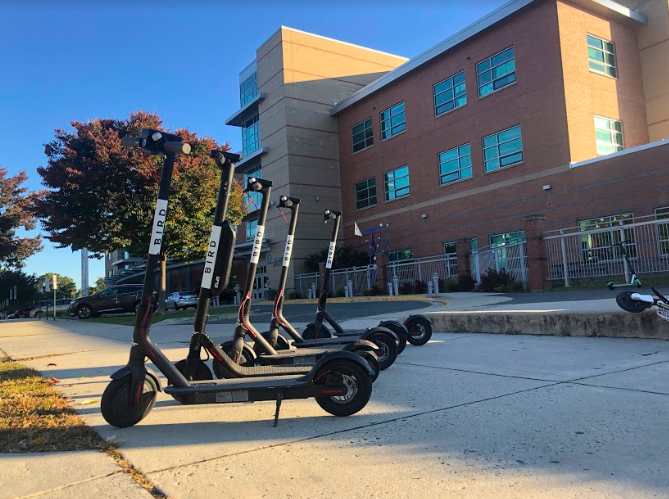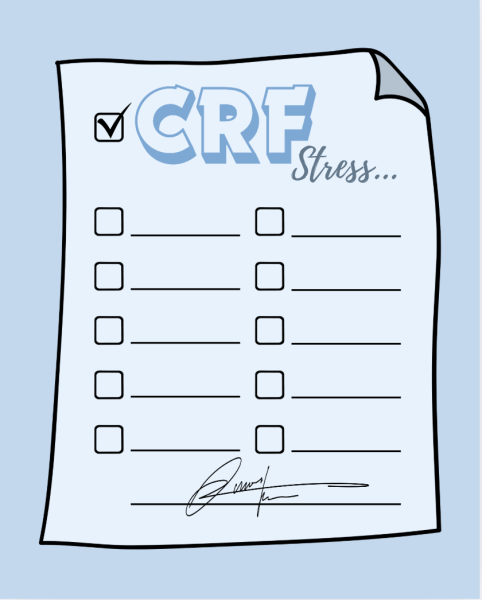Bird takes flight
Unless you have been living under a rock for the past few months, you have probably heard, seen, or ridden a Bird scooter. In the event you have not, Bird is a company that hopes to advance the efficiency and convenience of local transportation, by distributing electric scooters around cities and largely populated areas.
Although you must be over the age of 18 and have a driver’s license to ride the scooters, students at the school manage to get around this obstacle.
“I ride the Bird scooters all the time, because they are less tiring than a bike, especially for long distances,” junior Ryan Odenwelder said. “They are really easy to use and get me to my destination pretty quick.”
The company works through an app, similar to ride share services like Uber and Lyft, that tracks and displays scooters nearby, and their level of usable battery. Once near a Bird scooter, you simply open the app, and scan the barcode displayed between the handlebars. Once unlocked, it is yours to ride.
“I ride birds because how convenient they are,” junior Yonny Belihu said. “Birds also get me home faster than my car which is very surprising.”
The Bird scooters have a top speed of 15 miles per hour, and have a total range of about 15 miles. Other scooter share companies compete with Bird in cities as well, such as the Lime scooters. The pricing for the scooters varies depending on the city, but in Arlington and Washington, D.C., Bird charges you one dollar to unlock the scooter, and then 15 cents per additional minute. This is significantly cheaper compared to various other cities around the United States, including Abilene, Texas and Memphis, Tennessee which both charge 20 cents per additional minute.
“The price is only like 15 cents a minute after the first dollar you pay to unlock [the scooter,” Belihu said. “That’s a really fair price for the short distances I use birds for. I only pay like 3 dollars per ride.”
The company’s safety policy states that the necessary requirements to legally ride the scooters includes wearing a helmet, being at least the age of 18 and having a valid driver’s license. Bird also suggest staying out of the street and sidewalks to minimize the probability of an accident.
“I love riding the scooters, because they are fast, [and] I ride the scooters about everyday to school,” junior Othman Amarchih said. “I think riders should ride on the bike lanes to avoid accidents with people on the sidewalks.”
Since Bird was founded in April 2017, it has raised about 418 million dollars. With all the recent success from the scooter rental company, this still begs the question of how riders under the age of 18, specifically students at the school, manage to get their hands on the scooters without the necessary requirements.
“Most people I know who ride Bird, including me, never would use birds nearly as much as we do if we actually had to pay for them,” junior Henry Erwin said. “But since it’s so easy to get around the issue with the app, it’s worth the extra steps for the free ride.”
One way around the issue of needing a valid driver’s license and being of legal age to ride, involves the rider’s parents. Some parents are more than happy to use there driver’s license as well as a valid payment method for their child, if it means their teenager always has an accessible and quick ride home if necessary.
“The [Bird] scooters are helpful if I need a ride home and my parents are busy, or cant pick me up.” junior Zach Senkus said. “My parents just put in their credit card information, because it’s easier for both of us, if it saves them a trip.”
Although this method is not technically allowed, it is a another way for students trying to get around the age requirements Bird enforces for it’s riders. Another approach often used by students bypasses the payment requirements, and is arguably less acceptable.
“I ride the Bird scooters one to two times a week, but I have never paid for a scooter in my life.” junior Christian Auth said, acknowledging a malfunction in the Bird app.
This works because the Bird app does not register the issue until the ride is over, which at this point you log-out, and repeat the process. However, Bird has recently addressed their flaws found in their software within the app, and the number of students who regularly ride the Birds like this has declined.
“I used to ride around on Bird scooters with my friends mostly just for fun,” junior Jasper Kerr said. “After an update that actually checks your ID, I haven’t been able to.”
Despite the system for unlocking the scooters that ensure that the requirements are met, the fact anyone could ride the scooters regardless of age, or experience on a motorized vehicle still poses a large safety issue.
According to Streetsblog USA, “[In September] there were three such fatalities in just over a month. The death rate on shared e-scooters is now six times worse than the death rate for bike share systems.”
The company has received mostly praise, especially by those who live in busier areas, where driving can be a hassle. However, riders are consistently getting injured or even killed. The death rate is substantially higher than that of predecessor forms of eco-friendly transportation. If Bird wants to continue their exponential growth of success, they need to make major adjustments to ensure the overall safety of their customers.
“I think there are plenty of concerns with the scooter seeing as people have already died and got injured, [including] me,” sophomore Tim Naff said. “I got a concussion from one sadly, so I think they [should add] suspension or shocks so when you hit a bump you don’t go flying like I did.”
Despite the fact students at the school are getting injured, this can mostly be credited to students riding the scooters improperly, or not how Bird intends. Bird constantly is updating their app, and is currently is in the works of a new scooter, in hopes of fixing these safety issues. Bird also has most of the public backing up their success, considering they are an eco friendly option of transportation.
“They make transportation much easier, reduce carbon emissions, and are just fun to ride. That being said, they are dangerous to ride, especially without a helmet, and are causing many traffic problems.” said junior Ethan Burka. “It appears these safety issues are just growing pains for the successful starter company.”












